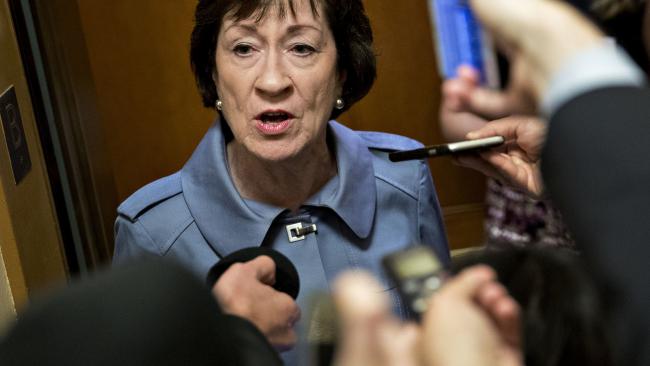(Bloomberg) -- House Republicans leaders are moving to quell a rebellion within their ranks over a stopgap spending bill needed to avert a government shutdown on Saturday by attempting to push forward with a two-week measure that expires Dec. 22.
Republicans emerged from a contentious morning meeting Tuesday saying that House Speaker Paul Ryan of Wisconsin and other leaders told them that the Senate is resisting a longer stopgap measure backed by the conservative House Freedom Caucus.
The Freedom Caucus on Monday night threatened to block progress on President Donald Trump’s tax bill unless the group gets support to extend the spending measure to Dec. 30. Caucus member Jim Jordan, an Ohio Republican, told reporters that doing so would give conservatives more leverage over senators who want to add legislation to the stopgap bill.
Senator Susan Collins, a Maine Republican, has made her tax vote contingent on passage of a bill shoring up Obamacare insurance markets, which Freedom Caucus members see as a bailout of President Barack Obama’s signature achievement.
John Cornyn of Texas, the No. 2 Senate GOP leader, said the Senate will move forward with a Dec. 22 measure because a Dec. 30 end-date does not accomplish anything.
“I’m not sure what that gets us, other than messing up the week between Christmas and New Year’s,” Cornyn said.
Funding to keep the government operating expires at the end of the day on Dec. 8. Republican leaders want to use two weeks before a new Dec. 22 deadline to negotiate with Democrats over how much money to give to defense and non-defense programs in the current fiscal year, which began Oct. 1.
After that, a second stopgap measure could push final budget decision-making into January, with that short-term measure also carrying late-December deals on that include shoring up Obamacare’s insurance exchanges.
Leaders told members they’ll gauge support among Republicans for a Dec. 22 stopgap measure. The House Rules Committee postponed a Tuesday meeting to prepare a Dec. 22 bill for a floor vote as leaders polled the rank and file. Hal Rogers, a Kentucky Republican and member of the Appropriations Committee, said most House Republicans support a Dec. 22 stopgap.
Debt Ceiling
The measure wouldn’t include an extension of the nation’s debt ceiling, which comes back into effect after Dec. 8. The Treasury Department has said it can avoid a government default at least through January and the Congressional Budget Office estimates it can be avoided into March. This week, the Bipartisan Policy Center, a research group, also estimated March, while saying that tax cuts working their way through Congress could move the date up into February.
Some conservatives said they’re being strong-armed by leaders.
“They told everybody what our will is,” said Louie Gohmert, a Texas Republican.
The Freedom Caucus rebellion could empower House Democrats to seek concessions on the short-term measure if their votes are needed to pass it. On Monday, Minority Leader Nancy Pelosi of California said she wouldn’t say how she’d vote on the six-page bill without seeing it.
Defense Spending
Freedom Caucus member Dave Brat, a Virginia Republican, told reporters he could vote for a Dec. 22 stopgap if he got assurances of a defense spending increase later.
Behind the scenes, top Democrats and Republicans are preparing for a Thursday negotiating session with Trump over a long-term budget deal. Democrats are seeking more funding for domestic priorities and permanent legal status for undocumented immigrants brought to the U.S. as children.
Cornyn told reporters today that any immigration deal trading enhanced enforcement for deportation protection would not be included in a year-end spending bill.
Conservatives in the Republican Study Committee are trying to influence the budget talks by presenting a list of $1 trillion in possible spending cuts to pay for military spending increases. The list includes cuts to Medicaid and food stamps through work requirements.
Bradley Byrne, an Alabama Republican, advocates attaching a full defense spending bill to the next stopgap measure that runs into January and daring Senate Democrats to oppose it.
“They could either do that and give a pay raise to our servicemen and women and provide the money we need to take care of these places with hurricanes, or they can shut down the government," he said.
